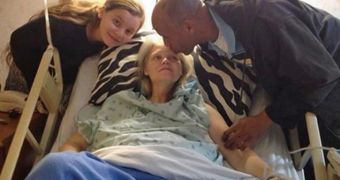A woman from Mississippi got the surprise of her life when, instead of triplets, as she was expecting because of the ultrasounds performed during the pregnancy, she gave birth to identical quadruplets.
Kimberly Fugate and her husband Craig were expecting three baby girls, Kenleigh, Kristen and Kayleigh. But in the delivery room where she underwent a cesarean section, the doctor announced, “There are more feet” and then delivered a fourth baby girl. They named her Kelsey.
The identical quadruplets were born on February 8 at Winfred L. Wiser Hospital for Women and Infants at the University of Mississippi Medical Center in Jackson, Mississippi.
The director of maternal-fetal medicine at UMMC, Dr. James Bofill, confessed that Fugate's case was a first in his 27-year career.
"I was very embarrassed, obviously. The news was sent to me by one of my fellows. I thought she was kidding," he said.
Although they were almost 13 weeks premature, the baby girls are all doing well and are kept under observation in the neonatal intensive care unit of the hospital. They are expected to stay in hospital until May, so the family has enough time to put everything in place back at home in Fayess, South Mississippi.
"I haven't been able to hold them yet, so it'll be very exciting to be able to take them home and love them," said the new mom.
The father didn't even know there was a fourth baby until he went to visit his wife. The woman showed him four plastic identification bracelets instead of just three, and asked him to count.
According to the Daily News, Kimberly considers the birth “a blessing” but, seeing that she and her husband also have a 10-year-old daughter, Katelyn, it seems that they don't plan on having other children.
Identical quadruplets are extremely rare, the chances of occurring being estimated at 1 in 13 million.
"The chances of having identical quadruplets — it's almost incalculable," said Dr. James Bofill.

 14 DAY TRIAL //
14 DAY TRIAL //